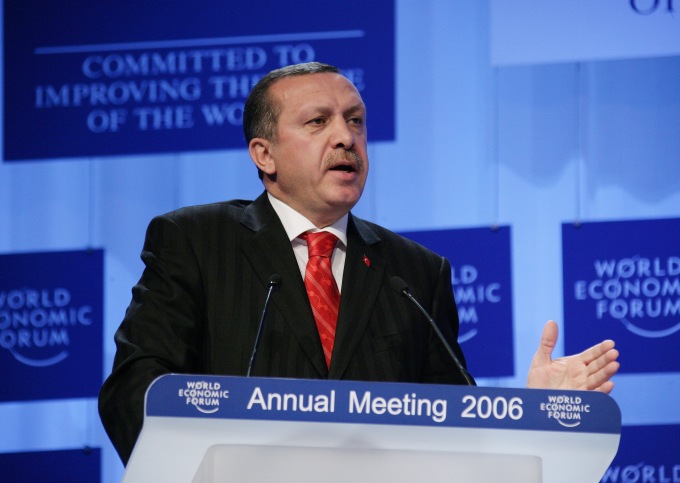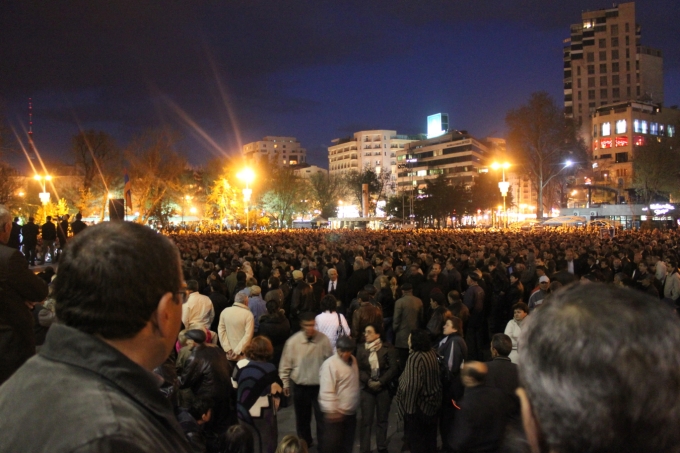
The governments of Kazakhstan and Kyrgyzstan have pushed back against Turkish requests to close schools in the country linked to the Fethullah Gülen movement, the Diplomat reports. This comes less than a month after the infamous coup d’etat attempt in Turkey last July, when certain factions in the Turkish military attempted and failed to seize control from Turkish President Recep Tayyip Erdogan. Erdogan and his government have since blamed the coup attempt on Gülen and his allies, and the government has been pushing other countries to close schools and other institutions with links to the controversial Islamic cleric. But despite the diplomatic and cultural ties between Turkey and the two Central Asian nations, Kazakhstan and Kyrgyzstan have been reluctant to accept this request.
Fethullah Gülen is a Turkish Islamic preacher and political figure who is the founder of the Gülen Movement, an ideological Islamist network that puts an emphasis on science, interfaith dialogue, and multi-party democracy. And even though he left Turkey in 1999 to live in self-imposed exile in the United States, his presence and influence has still most certainly remained in the country and around the world. There are still millions of members of the Gülen Movement in Turkey, and many more outside of the country. And for a while, the Turkish government under Prime Minister (and now President) Erdogan had no problem with this, even considering Gülen and the members of his movement allies at one point. And it makes sense that Erdogan and Gülen would be considered partners: Erdogan and his government are Islamist-rooted, as is the Gülen movement. But this cooperation did not last, as some analysts speculate that a power struggle between Erdogan and the exiled cleric was forming in Turkey. In 2013, a major corruption scandal broke, where it was rumored that the Movement was involved in uncovering the corrupt practices of many associates of Erdogan’s ruling Justice and Development Party (AKP). After the scandal was uncovered, many protesters took to the streets calling on Erdogan to resign.
Following this incident, Erdogan viewed Gülen and his network under a much darker light. Government crackdowns surrounding people related to the Movement occurred in the following years, just as Erdogan began to consolidate power in the country and fight back against most critics against him. Erdogan’s increasingly authoritarian mode of governing culminated in the coup attempt July 15th, as well as the following days and weeks in which Erdogan has increased his purges against “enemies of the state” and blamed the coup attempt on Gülen. His government has since called on the United States to extradite him so he can stand trial in Turkey; however, since there is no proof that Gülen was involved, the US has thus far denied these requests. This, along with the most recent purges in the country and the increasingly authoritarian tendencies of President Erdogan, has led to friction with Turkey and the Western countries.
Erdogan has accused Gülen, who is now public enemy number one in the country, of establishing a parallel government in Turkey; and although this is an exaggeration, the power and influence of the Gülen Movement should not be underestimated. While the group claims not to be political in nature, it has amassed a following that is millions of people strong with schools, hospitals, cultural centers, and other institutions across the world. Now, ever since the fallout between Erdogan and Gülen, all schools related to the network in Turkey have been banned, but they still exist elsewhere. In fact, Gülen-linked institutions exist in some capacity on every single continent outside of Antarctica, with the most probably being in the United States, where Gülen resides. In Texas, Gülen schools are thought to be the largest chain of charter schools in the state. Of course, it is hard to know exactly how many of these institutions are exactly affiliated with him due to the amorphous nature of the Movement in general, but outside of the US, another major stronghold appears to be the Central Asian nations of Kazakhstan and Kyrgyzstan.
Ever since the fall of the Soviet Union, the Gülen Movement saw a major opportunity in largely-Turkish Central Asia to spread its influence. Most of the countries in former-Soviet Central Asia have close cultural ties to Turkey, and in the post-Cold War era Turkey has also spread its political influence in these countries. In Uzbekistan, the government quickly set out to stomp out any institutions and influence that the network may have ever had there, even predating the Erdogan-Gülen split. And in non-Turkish Tajikistan, where the movement had gained some ground, the government banned the group under Turkish pressure last year. But elsewhere in Central Asia, the Gülen Movement has been wildly successful. In Kazakhstan and Kyrgyzstan, Gülen schools are considered some of the most professional in these countries and already teach thousands of students. Even though they remain the only two countries in Central Asia that host them, the region itself is another major stronghold for the Gülen network; which makes it an important target for the Turkish government.
Let us first go over the position of the Kazakh government, which, although so far denying Turkish requests to close all schools, has bent to Erdogan’s will in some way. Kazakhstan’s President, Nursultan Nazarbayev, was the first foreign leader to visit the Republic of Turkey post-coup attempt, and while there he said that “it is not in our interest to do something against Turkey” and that they had “reached an agreement.” While meeting with Erdogan, he agreed to expel any teachers in Kazakhstan with links to Gülen, but stopped short of saying that he would close all of the Gülen-affiliated schools. Read more about Nazarbayev’s visit to Turkey and response to the coup in this Reuters article here. Obviously, Kazakhstan wants to maintain good relations with a close strategic ally (Turkey), so the government is making some concessions. It is too early to say, however, if Turkey will ask for more, and if Kazakhstan is willing to close all of the Gülen schools in the country.
The reaction from the government of Kyrgyzstan was much more forceful and blunt, which came as a surprise for me personally. Kyrgyzstan, probably one of the least stable countries in post-Soviet Central Asia, has always been on edge from protests at various points in its history and even a revolution in 2005 that brought down the government. So when Ankara sent messages to Kyrgyzstan that Gülen and his network might be planning a coup in the country, they were probably expecting to be taken seriously. They were not. In response to these threats by the Turkish government, Kyrgyz President Almazbek Atambayev stated that the notion was “absurd – to say that coup threatens Kyrgyzstan. Don’t bully us!” He even went so far as to taunt Turkey, saying that “if Turkey is so smart, why did it miss a coup?” This rebuke is surprising because Kyrgyzstan has historically reacted with hostility to anything Islamic, and the Gülen network is Islamist in nature. Just recently, Atambayev encouraged women not to wear traditional Islamist dress by suggesting that they may be hiding a bomb underneath their clothes, and that “women in mini skirts don’t become suicide bombers” (read more about that story here). But Kyrgyzstan’s protection of the Islamist Gülen movement remains, which either shows just how influential the network is in the government or how scared Kyrgyz officials are of the potential backlash that could occur if they were to close those schools. Although this is admittedly just pure speculation on my part, Atambayev is widely unpopular in Kyrgyzstan, and he may not wish to test the fates and close down institutions that provide education for thousands of Kyrgyz citizens.
Does all of this mean that Gülen’s schools will always remain open in Kazakhstan and Kyrgyzstan? No. Kazakhstan in particular has seemed to allow some concessions for Turkey, and even though they have not gone so far as to close any of these schools, it is not out of the realm of possibilities that it may happen sometime in the near future. And although Kyrgyzstan reacted harshly to Turkey’s pressure, it could succumb to it eventually. Turkey is an important partner for Kyrgyzstan due to the immense cultural and political ties between the two. However, Turkey’s claims that Gülen may be planning a coup in Kyrgyzstan is nothing but scare tactics, and even the claim that Gülen himself was involved in the coup is baseless. There is absolutely no proof that he orchestrated it, and if there was, then the Turkish government would have already provided it so that he could be extradited from the United States. I don’t applaud those who attempted the coup in Turkey, but there is no doubt that President Erdogan is taking advantage of it to get back at his own personal rival, Gülen. Although I may not agree with the Gülenist Islamist ideology, he and his network have a right to set up these institutions unless they are threatening to overthrow the government, and while Turkey claims that Gülen is trying to do just that, once again, there is no proof that they set up these “shadow governments” as Erdogan states. I won’t deny that the Gülen Movement is not completely apolitical in nature, but it still has a right to exist. So Kazakhstan, Kyrgyzstan, and the entire international community should not give into Erdogan’s pressure to label Gülen and everyone affiliated with him as terrorists without any evidence and ban all of his institutions. Erdogan has no right to do this, and for Kyrgyzstan’s president to call him a “bully” in this regard is surprisingly very accurate.
